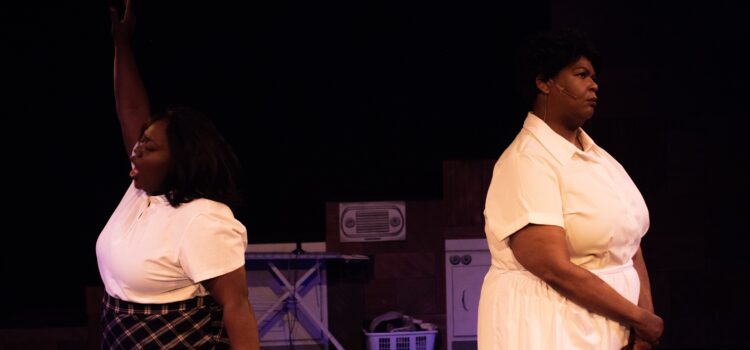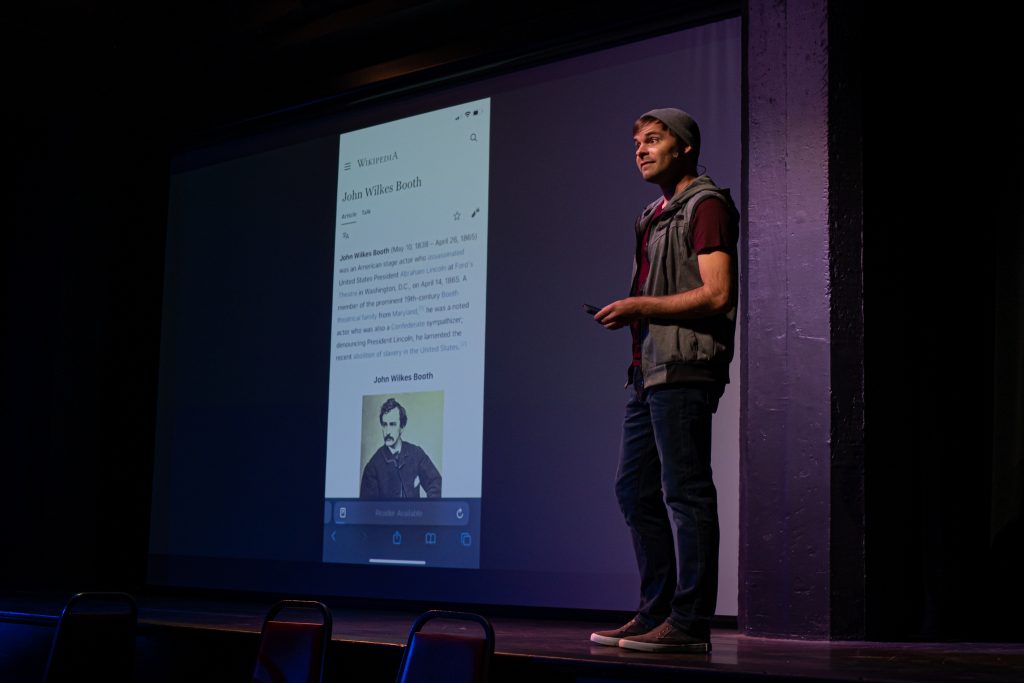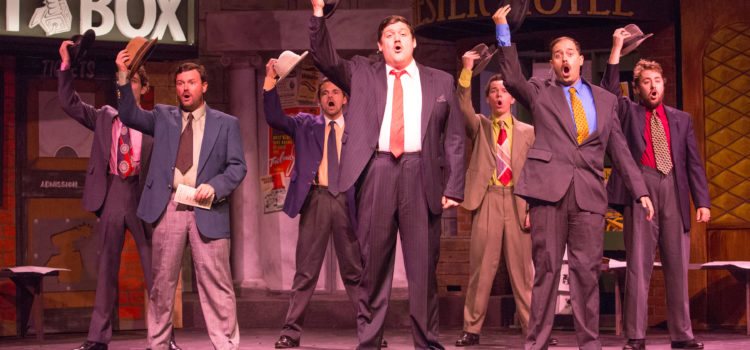By Lynn Venhaus
The powerhouse cast of the musical “Caroline, or Change” features so many gifted vocalists that they raise the roof off The Marcelle Theatre every performance. To hear the soul-stirring solos and harmonies blended by this virtuosic ensemble is a scintillating experience.
It doesn’t matter if you are unfamiliar with the emotional rollercoaster of a score by composer Jeanine Tesori and lyricist Tony Kushner that creates a unique stamp of time and place in Lake Charles, Louisiana in 1963, just go and be in awe of the power and performances.
It’s easy to gush about this uncommon show, and as a longtime reviewer who tries to mix up the superlatives, so I don’t overuse them, it is hard to come up with new words that aptly describe this level of talent involved.
Yes, it’s unforgettable. Yes, I can’t believe the singers held nothing back and still had something in the tank. And yes, I want to learn more, listen again, and sing its praises. Most of all, the performers express their truth from varied perspectives. In the framework of an intense domestic drama, the characters focus on their own needs, but must see the value in others.
Three years in the making, Fly North Theatricals patiently waited out the pandemic, and some of those originally cast in 2020 have returned while others are new. Director Brian McKinley, an accomplished multi-hyphenate who wasn’t present at those early auditions, has said he has been blessed with talent. Indeed, the proficient ensemble is world-class in quality, and McKinley deftly stations them around an intimate space to spotlight highly personal interactions, which are aided by Bradley Rohlf’s artful lighting design.
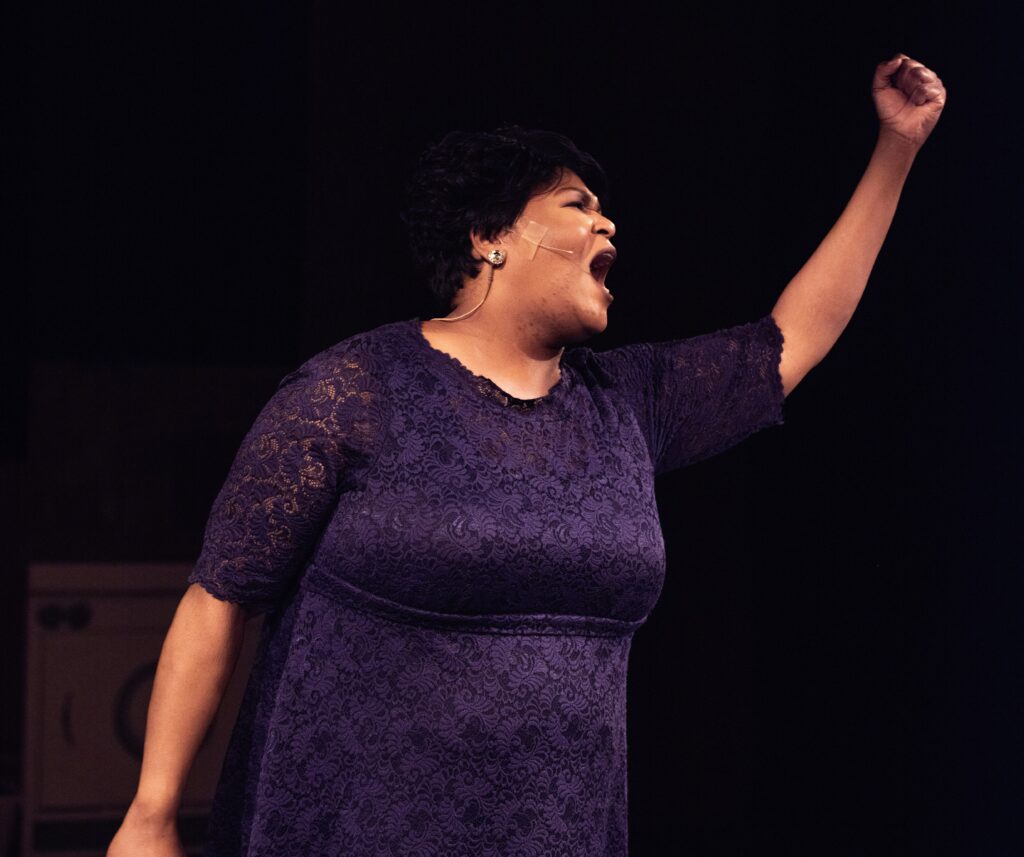
Music Director Colin Healy, the group’s founder, has masterfully conducted an orchestra that seamlessly blends blues, gospel, spirituals, traditional Jewish klezmer melodies, Motown, folk and classical music.
The versatile top-shelf musicians include Steve Frisbee and Kate Denson on violins, Chuck Evans and Alyssa Przygoda Gove alternating on viola, Marie Brown on cello, Mary Wiley, Brandon Thompson and Dave Metzger on reeds, Blake Mickens on bass, Des Jones on percussion, and Healy on keyboards.
This is crucial because it’s an all-sung show. The first act features 24 songs in an hour, and after a 15-minute intermission, the second act has 25 songs in 70 minutes. The demanding nature requires every single person on stage and off to be in peak form, and they meet the challenge.
The story takes place mostly in the basement of a Southern home where Caroline Thibodeaux works as a maid for $30 a month. It starts on a hot day, and she laments having to do laundry “16 Feet Beneath the Sea.” Second act will transition to the December holidays, but it’s still oppressive conditions.
Caroline reveals her world-weary and cynical attitude, and you’ll discover an unusual protagonist because she is not a sitcom-y warm and fuzzy housekeeper. She has been beaten down by life. It’s 100 years after slavery, but segregation and inequality haven’t subsided. In a tour de force performance, De-Rance Blaylock commands the stage, making us feel her pain and anger.
She’s caught in-between being marginalized and believing she deserves more, living on the cusp of change. You root for her, hoping her life will get better, but as we soon find out, it will be up to her children to help make the world see them. Blaylock, who was in the groundbreaking “Antigone in Ferguson” at the Harlem Stage in 2018, is a consummate performer, and fiercely announces her presence.
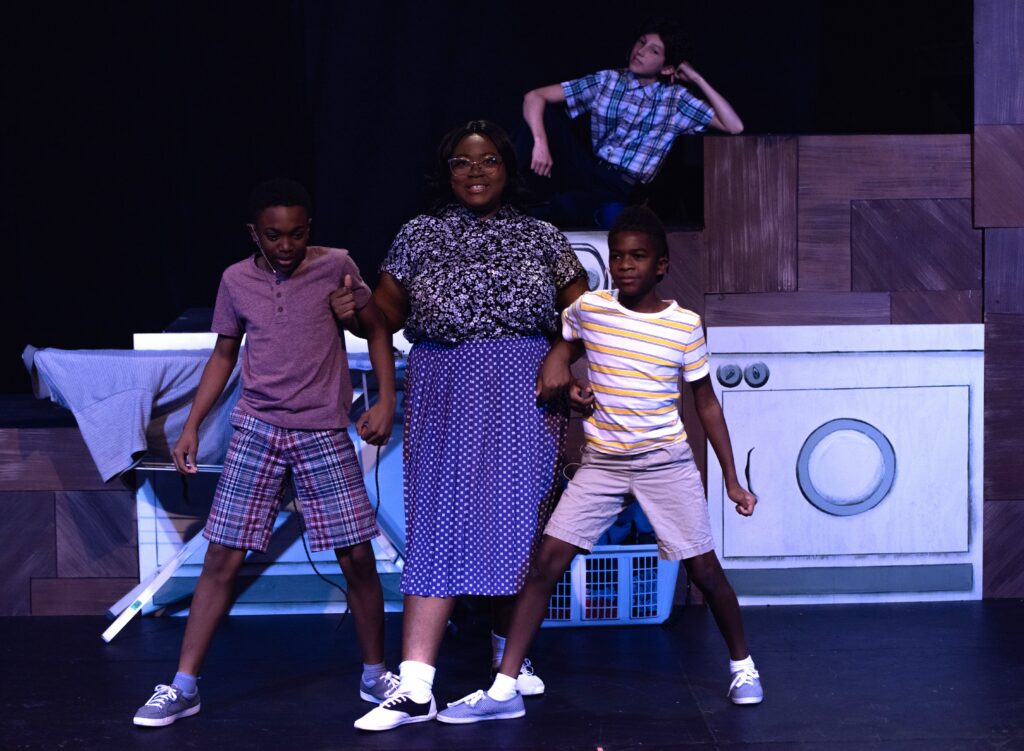
Resigned to her fate, Caroline has been working hard at these tasks for 22 years, without much to show for it. She is turned down for a raise, among other indignities throughout the show. She is, however, allowed to keep the loose change found in the dirty clothes. Her adoring 8-year-old charge Noah knows his pocket change is beneficial, acts absent-minded about it, but knows what he’s doing. The plot escalates when an errant $20 bill is the cause of much handwringing. She could really use it for a child’s dental work and better food for their nutrition. But it is a gift from his maternal grandfather.
Caroline is a single mother to Emmie, 16, (Kenya Nash), Jackie (Cameron Headley), 10, and Joe (Malachi Borum), 8. The needy kids dig at a traditional Christmas in “I Saw Three Ships” and they express their financial situation in the jaunty “Roosevelt Petrucius Coleslaw.”
In one of the more dynamic relationships, Caroline and rebellious Emmie butt heads about how to talk to white people, navigate changing times, and even dare to dream and hope. Nash is strong in “’Night Mamma” and “I Hate the Bus,” among other numbers.
There is an authenticity to their emotionally charged interactions, and things really get testy in “Kitchen Fight.”
Caroline has had a lifetime of disappointments, including a failed marriage. She slumps in a chair, taking a break in her white uniform, and allows Noah to light her cigarette.
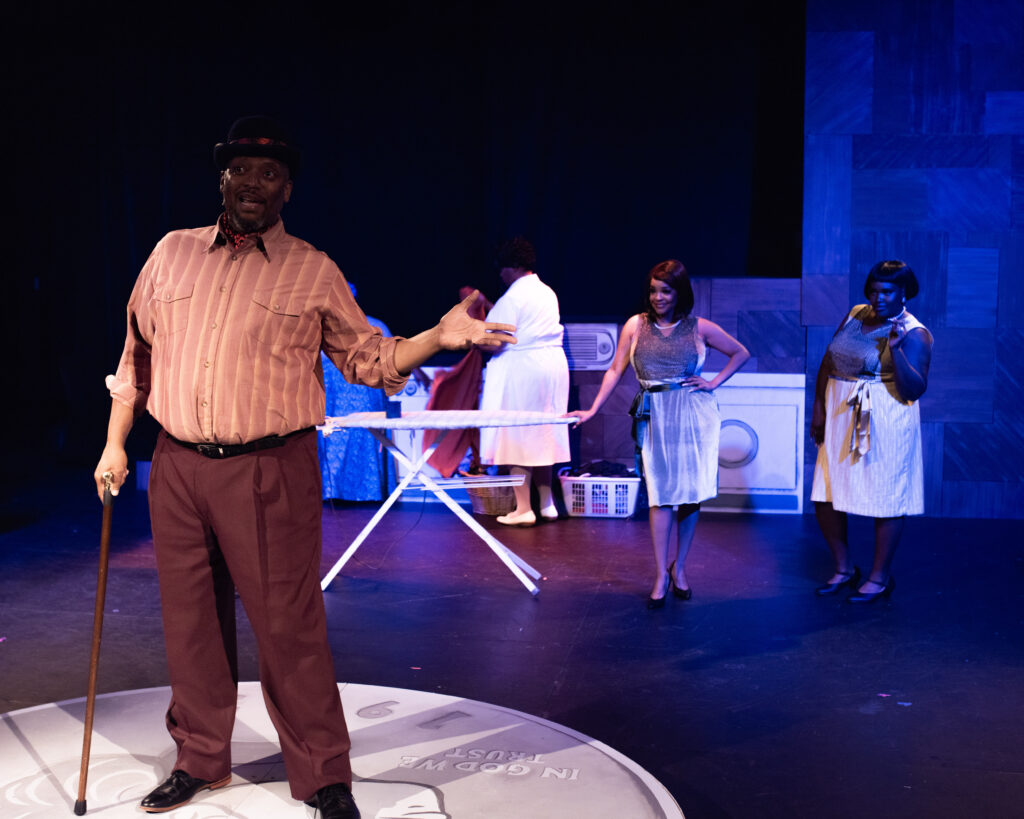
This is a secret because he lost his mother, a heavy cigarette smoker, to lung cancer, and his father has remarried. The little boy clings to his anchor, Caroline, although she never reciprocates caring. In a stunning debut, Zoe Klevorn demonstrates remarkable poise and vocal ability as Noah. (The only thing out of place is a wig too big for her delicate features).
As his widowed father Stuart, Jordan Wolk subtly conveys a distracted, conflicted parent in mourning. He has lost his faith, “There Is No God, Noah.” In his complicated relationship with his son (“Stuart and Noah”), he seems overwhelmed.
A professional musician, Stuart is now married to Rose, a typical cookie-cutter ‘60s housewife and a well-meaning stepmother. However, she really is clueless, exudes privilege, and is without compassion when dealing with Caroline and her hardships. The Gellmans aren’t racists, but lack forward-thinking, and appear to be products of their time, living in the South.
Avery Lux embodies that post-war Stepford Wife- pretty blonde (ancient advertising reference, a ‘Breck girl’) type. Noah doesn’t like her, and she confesses to her father, Mr. Stopnick (Kent Coffel) her dismay (“Long Distance”). Eventually, the relationship kinks start to soften with the boy (“Why Does Our House Have a Basement?”) But yet, the smugness (catch her mispronouncing “Caroline.”)
Lux looks chic in customary fashions of the day, but her pale-yellow frock needed ironing. With other period costumes designed by Vanessa Tabourne, some of the shoe choices aren’t accurate. For instance, if a character mentions their saddle shoes, she should have a pair on, but nope. (I saw a youth production of “Grease” last week and they had them on Rydell High Schoolers, so they can be found.)
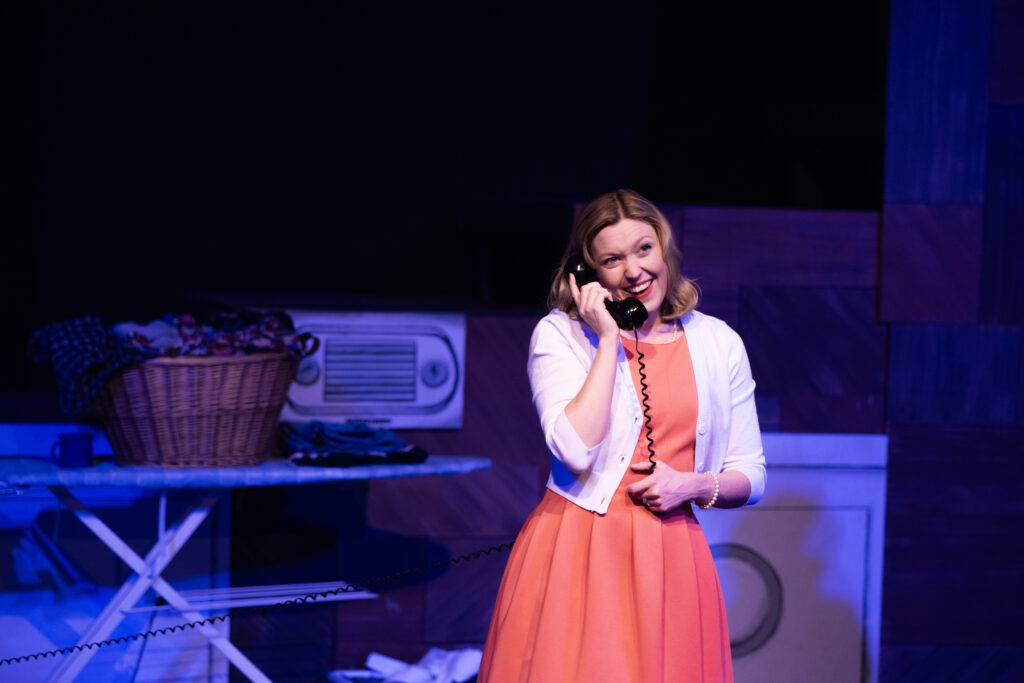
While Caroline is washing/drying clothes in the first act and ironing in the second, she imagines appliances as people – including the washing machine (a spunky Kanisha Kellum). She listens to the radio, where a robust trio of singers, not unlike the popular girl groups of the day, springs forth.
Kimmie Kidd-Booker, who is also the Moon in a gorgeous white gown, impresses as a glamorous Diana Ross look-a-like, and merry pair Ebony Easter and Adrienne Spann are the spirited singers in sync with each other, all three replicating the sounds on the airwaves, such as “Ooh Child” and “Salty Teardrops” while they wear fashionable cocktail dresses.
Caroline is so cranky that those close to her try to be helpful but nearly give up, especially Dotty (Kellum again, outstanding in a dual role).
A major occurrence is the assassination of President John F. Kennedy on Nov. 22, 1963, and this is not merely a time marker. Kushner smartly addresses that as a significant bellwether in turning tides..
Both families express their admiration for the fallen leader in “Inside/Outside” and “JFK,” although Emmie is more mesmerized by Martin Luther King Jr.’s messages. The Gellman family includes Jewish grandparents, played by Maria Bollini and Ken Haller, who guide Noah spiritually.
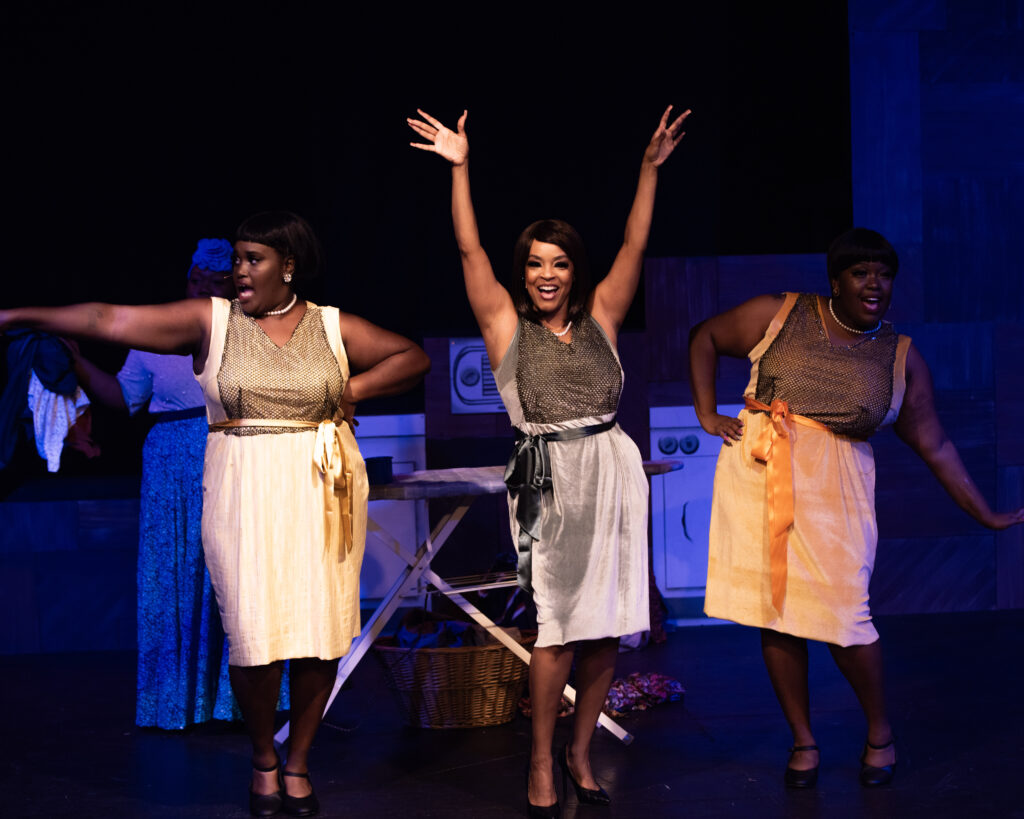
Act Two starts out with the Radio singing “Santa Comin’ Caroline” and “Little Reward” while the household gets ready for a Hanukkah Party. Caroline also reminisces about her ex-husband in “1943.”
With his richly textured baritone, Duane Foster sings the roles of The Dryer, The Bus, and portrays the wayward ex. He regularly appears at the Muny, was recently in the “Beauty and the Beast” ensemble. On Broadway, he was a part of the original cast of “Ragtime” in 1998 and understudied the lead Coalhouse Walker (role originated by Brian Stokes Mitchell).
Church-going Caroline comes to a reckoning about the dust-up caused by the $20, and Blaylock brings the house down with a mesmerizing “Lot’s Wife”: …”Ain’t never been no good, findin’ joy the way you should…murder my dreams so I stop wantin,…strangle the pride that make me crazy!” Gut-wrenching.
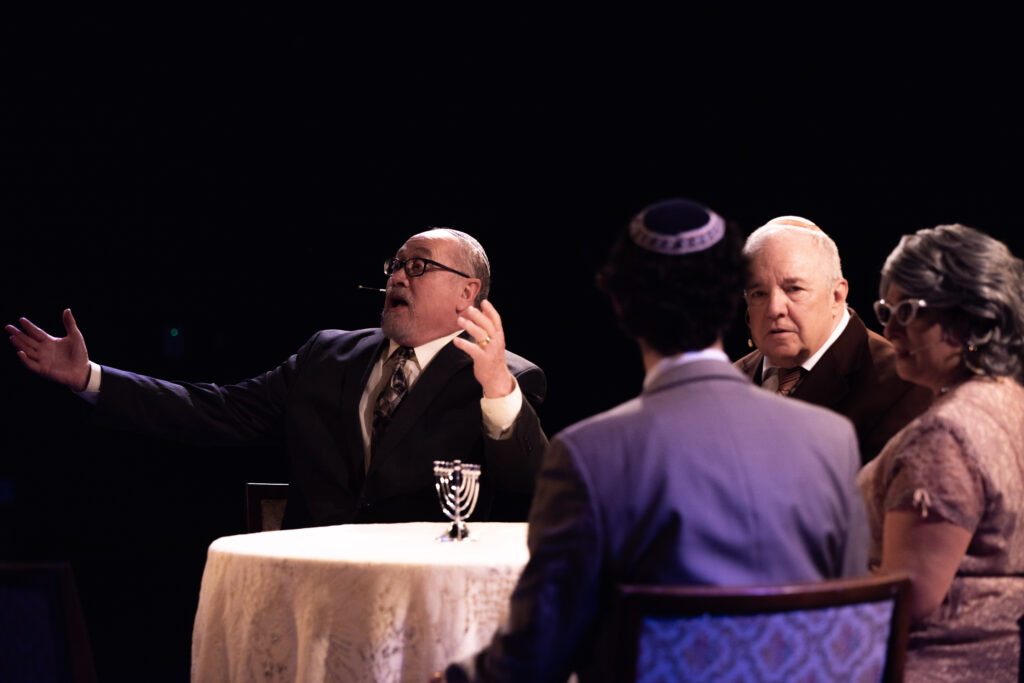
This sly, simmering show is rarely done, mainly because of its difficulty level, and this is indeed a high point in a very strong theatrical season for regional professional groups. To be introduced this way to the Tesori-Kushner poetic and profound pairing is quite a treat.
First produced off-Broadway in 2003 after readings and workshops started in 1999, the show moved to Broadway in 2004, garnering six Tony nominations, including Best Musical, and a win for Anika Noni Rose for Featured Actress in a Musical as Emmie. A British National Theatre production in 2007 won an Olivier Award for Best New Musical and both a London West End revival in 2018 and Broadway revival in 2021 were heralded.
Tesori is the most honored and most prolific female theatrical composer in history, writing five Broadway musicals and receiving six Tony Award nominations. For “Caroline, or Change,” she won the 2004 Drama Desk Award for Outstanding Music.
In 2015, she made history winning Best Original Score with Lisa Kron for “Fun Home,” making them the first female writing team to win that award. And earlier this summer, she won Best Original Score for Tony Award-winning Best Musical “Kimberly Akimbo,” which she shared with David Lindsay-Abaire.

Also known for “Thoroughly Modern Millie” and “Shrek the Musical,” you may have seen her reboot of “The Unsinkable Molly Brown” at the Muny in 2017, which went on to off-Broadway rave reviews but run cut short by global coronavirus pandemic.
Kushner is one of the few playwrights in history nominated for Emmy, Grammy, Oscar, and Tony Awards. He is most known for “Angels in America: Millennium Approaches” and “Angels in America: Perestroika,” his Broadway debut in 1993, which won a Pulitzer Prize for Drama and a Tony Award, and he won an Emmy for adapting it for the HBO miniseries. Since the 2000s, he has collaborated with Steven Spielberg on his films “Munich,” “Lincoln,” “West Side Story” and “The Fabelmans.”
This is his compelling personal semi-autobiographical story, for his father really was a clarinet player and a conductor, and his parents moved to Lake Charles, Louisiana, when he was a child.
The mindful alliance between Tesori and Kushner has produced an astounding uncompromising musical. The ‘change’ is both economical and political, at once an historical footnote and present-day conundrum. The underlying issues haven’t gone away and racial hatred for blacks and Jews has alarmingly escalated during the past 10 years.
“Caroline, or Change” gives us heartfelt snapshots that hopefully lead to more understanding. It’s a moving, meaningful musical, and this resplendent production takes flight because it resonates deeply.
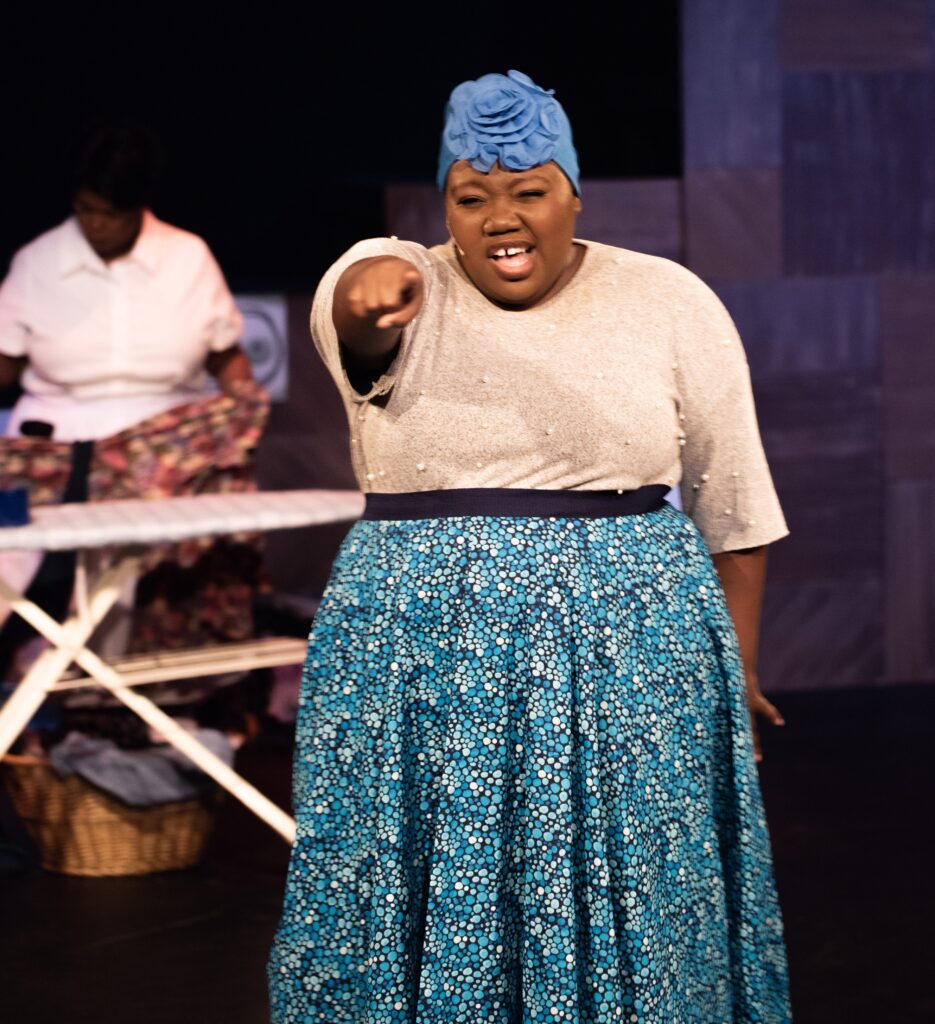
Fly North Theatricals presents “Caroline, or Change” July 28-Aug. 12, with performances at 7:30 p.m. Friday and Saturday and at 2 p.m. Sunday at The Marcelle, 3310 Samuel Shepard in Grand Center. A 2 p.m. matinee has been added for Saturday, Aug. 12. For more information, flynorthmusic.com or for tickets, go to www.metrotix.com.
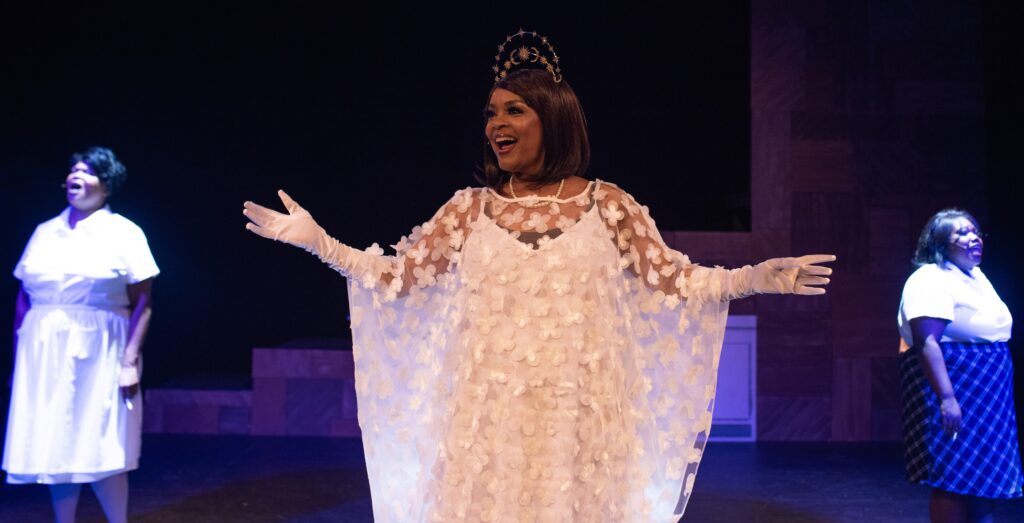

Lynn (Zipfel) Venhaus has had a continuous byline in St. Louis metro region publications since 1978. She writes features and news for Belleville News-Democrat and contributes to St. Louis magazine and other publications.
She is a Rotten Tomatoes-approved film critic, currently reviews films for Webster-Kirkwood Times and KTRS Radio, covers entertainment for PopLifeSTL.com and co-hosts podcast PopLifeSTL.com…Presents.
She is a member of Critics Choice Association, where she serves on the women’s and marketing committees; Alliance of Women Film Journalists; and on the board of the St. Louis Film Critics Association. She is a founding and board member of the St. Louis Theater Circle.
She is retired from teaching journalism/media as an adjunct college instructor.

